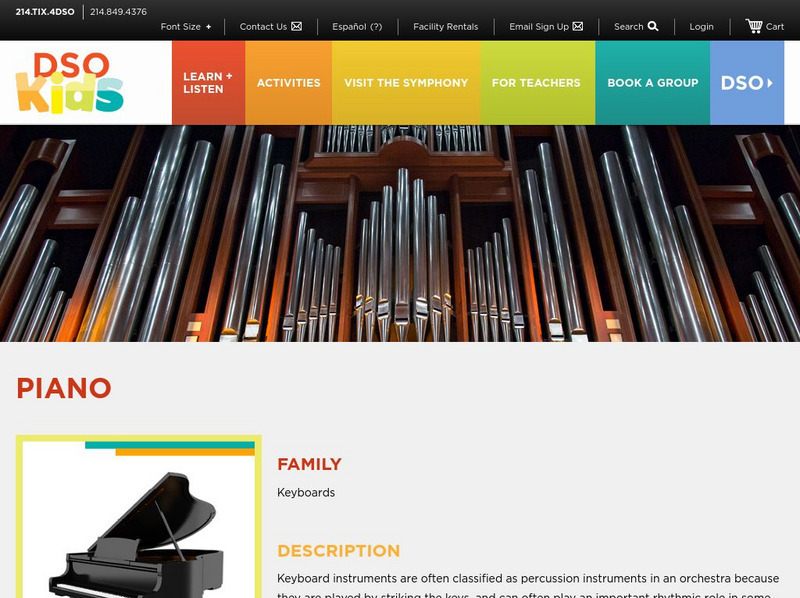Curated OER
Strings that Sing
Students listen to Isaac Stern lead a musician through steps to self-evaluating a performance. They compare their instrumental performance with a live vocal performance.
Curated OER
Geo Jammin' - Day 4, Lesson 15: Geo Jingo Jivin'
Second graders explore how musical instruments h ave varying geometric shape, and how those geometric shapes correspond to three-dimenaional shapes that students have studied.
Curated OER
Describing Music
Fifth graders listen to the 9th symphony and identify the tiri-ti rhythm. They identify the number of times they hear a phrase "turn, turn, turn". They then describe the meaning of one song and answer questions in class discussion.
Curated OER
Timbre II
In this music worksheet, students learn that timbre, or tone color, means different kinds of sounds. Students complete 10 questions about timbre and general music topics.
Curated OER
Gamelan Music-- Bela Bartok
In this music worksheet, students investigate gamelan music of Bali and in particular a piece by Bela Bartok. Students read about the history and unique instrumentation and answer 8 questions. Note: It appears that students need access...
Curated OER
Boombox Classroom: Ensembles
In this music worksheet, students identify types of ensembles. They order duet, quartet, solo, and trio by the number of performers in each. Students complete a word search, looking for ensemble related words.
Curated OER
Boombox Classroom: Ensembles
In this music worksheet, students list as many different ensembles as they can. They define ensemble. Students complete a word search, looking for names of ten ensembles. Students are introduced to the bass clef symbol.
Curated OER
Spellbound #3
In this vocabulary instructional activity, students read 20 clues, choose the answer from a word bank and complete a crossword puzzle. There is no theme for the puzzle; it just features interesting trivia.,
Curated OER
Pantomime Exercise
Learners of any age can learn to communicate using gestures and their bodies. They create a pantomime of a specific activity without using any words. This resource includes a link to an Off-Broadway Workshop for kids.
Alabama Learning Exchange
Alex: Instrument Families of the Orchestra: Brass
A lesson that familiarizes students with the brass family of instruments in an orchestra. Students will identify each instrument by sight and sound, as well as, name the instruments in order from highest to lowest sound.
Alabama Learning Exchange
Alex: Instrument Families of the Orchestra: String
During this lesson students will learn to identify and name the instruments in the string family of the orchestra. Students will also order the string instruments from highest to lowest sound.
Alabama Learning Exchange
Alex: Instrument Families of the Orchestra: Woodwind
This activity helps students identify the woodwind family of instruments in an orchestra by sight and sound. The students will also identify which instruments have a single reed, double reed, or contain no reed.
Alabama Learning Exchange
Alex: Instrument Families of the Orchestra: Percussion
In this lesson, students will learn to identify the percussion instruments in an orchestra by sight and sound. Students will also learn to group the percussion instruments into pitched and unpitched instruments.
Dallas Symphony Orchestra
Dallas Symphony Orchestra Kids: Trumpet
The trumpet has the highest pitch in the brass family. Read more about the trumpet and about the brass family of instruments in general when using this resource. Use RealAudio or Windows Media Player to listen to the trumpet by itself...
Dallas Symphony Orchestra
Dallas Symphony Orchestra Kids: Chimes
The chimes are the tall tube looking things in the orchestra. Read more about percussion instruments, the chimes in particular. Use RealAudio or Windows Media Player to listen to the chimes on their own and with the orchestra.
Dallas Symphony Orchestra
Dallas Symphony Orchestra Kids: Xylophone
The xylophone is a percussion instrument that is tuned and has a keyboard shape. Use this resource to learn more about it and the other instruments in the percussion family. Use RealAudio or Windows Media Player to hear the xylophone by...
Dallas Symphony Orchestra
Dallas Symphony Orchestra Kids: Flute
Read about the flute, how it produces sound, and how it's made. Learn about the woodwind family and the differences in the divisions in the three branches of this family. Use RealAudio or Windows Media Player to hear the flute alone, and...
Read Works
Read Works: Musical Instruments: The Symphony Orchestra
[Free Registration/Login Required] An informational text about the instruments in a symphony orchestra. A question sheet is available to help students build skills in reading comprehension.
Dallas Symphony Orchestra
Dallas Symphony Orchestra Kids: Tambourine
Use this resource to learn about the percussion family of the orchestra, the tambourine in particular. Learn what it is made of and how it is played. Use RealAudio or Windows Media Player to listen to the tambourine alone and with the...
Dallas Symphony Orchestra
Dallas Symphony Orchestra Kids: Tuba
Read about the brass family, and the tuba in particular. Use RealAudio or Windows Media Player to listen to the tuba by itself and with the orchestra.
Dallas Symphony Orchestra
Dallas Symphony Orchestra Kids: Teachers Lounge
Although this is considered a teachers lounge, it has many activities for students too. Teachers will love this because there are many lesson plans as well as other activities to do with their students.
Open Curriculum
Open Curriculum: Orchestral Instruments
To provide an introduction to orchestral instruments of the modern Western orchestra
Dallas Symphony Orchestra
Dallas Symphony Orchestra Kids: Piano
Read about keyboard instruments and the piano in particular. Use RealAudio or Windows Media Player to hear the piano alone and with the orchestra.
PBS
Pbs Learning Media: Atlanta Symphony Orchestra: Live Exploration
Take a special trip to the Atlanta Symphony Orchestra with GPB Education! This interactive virtual exploration offers students a behind-the-scenes experience as they learn about the science of sound and the preparation it takes to put on...






















